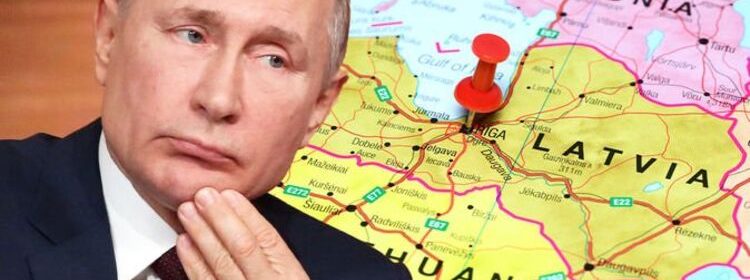Russia could eye Baltic states invasion despite NATO support: ‘Need to wake up’

Russia will aim to annex Baltic states warns army chief
We use your sign-up to provide content in ways you’ve consented to and to improve our understanding of you. This may include adverts from us and 3rd parties based on our understanding. You can unsubscribe at any time. More info
Russia is more than a day into its full-scale invasion of Ukraine as gunfire has echoed throughout the country’s capital. He is describing what is widely being viewed as a belligerent act as “special military action” in order to protect Russia’s own interests. Missile strikes have hit regions across the country including Kyiv, with an estimated 137 lives already lost.
Putin has urged the Ukrainian military to lay down their arms in order to avoid conflict.
But Ukrainian forces have been seen taking up positions ready to defend their city, as President Volodymyr Zelenskyy remains in government buildings.
Now that the Kremlin has made its intentions in Ukraine clear, many neighbouring countries that were also part of the former Soviet Union have started to voice concerns that they could be next in Putin’s line of sight.
This includes the Baltic States — Lithuania, Latvia and Estonia — which were all once a part of the USSR.


On Thursday, Lithuania’s President Gitanas Nausėda signed a decree imposing a state of emergency.
In a statement, the president’s office said: “The aim of the state of emergency is to address the serious threat to public security… in response to possible unrest and provocations involving large-scale military forces in the Russian Federation and the Republic of Belarus.”
While the Baltic states are all part of NATO, Professor Julian Lindley-French, an internationally recognised strategic analyst and adviser in defence, who has worked with NATO, questions the extent to which the alliance would be able to protect its members in the face of Russia.
He told Express.co.uk: “If we don’t wake up then Putin will always test our limits.
JUST IN: Putin has sealed his fate… now face down this monstrous bully

“If you look at a map, if Ukraine falls to Russia, with Belarus already in the Russian sphere, how on earth do we actually defend the Baltic states?
“How on earth do we defend the North Cape of Norway, or [Norwegian archipelago] Svalbard from a Russian land grab?
“If Russia’s strengthening of its submarine force goes on, how do we protect the resupply and reinforcement across the Atlantic if we can no longer maintain that area away from Putin?”
Like Ukraine, all the Baltic states have deep and intertwined histories with Russia.
DON’T MISS
Show host mocked after saying holiday ruined by Putin [REPORT]
Should UK force strict Russian sanctions despite EU caving? [INSIGHT]
Sky News viewers shocked as ‘awkward’ Ukraine phone call aired [ANALYSIS]


Each had been a part of the Russian Empire since the end of the 18th century.
After the Russian Revolution of 1917, they became independent states.
But the Kremlin annexed the trio in 1940 during the dramatic days of World War 2 when Paris fell to Germany, each becoming republics of the Soviet Union.
They did not gain their independence again until September 1991, when the Soviet Government finally recognised them as sovereign states.
While an imminent threat to the Baltics seems unlikely, the three countries worry about Russia’s ability to cut them off from the rest of Europe via the Suwalki gap.
This is a narrow, tough-to-defend 65 kilometre piece of land on the Polish-Lithuanian border, a strip which connects the Baltics and the rest of NATO.

This stretch is seen as one of NATO’s most vulnerable points.
To the west lies the heavily weaponised Russian exclave of Kaliningrad; to the east is Belarus.
Last week, Marius Laurinavičius, an independent security consultant in Lithuania, told the Financial Times: “We are becoming West Berlin, as a smaller country surrounded by an enemy that has much more military might.”
The Baltics are the only former Soviet states that have joined the EU and NATO, and provided an example to the likes of Ukraine over a possible route to European integration.

Kusti Salm, permanent secretary at Estonia’s ministry of defence, said war games being carried out in Belarus with Russian forces meant Moscow had ten times the number of forces in the region than NATO has on its eastern flank in the Baltics and Poland.
He said Russia’s show of military strength and readiness was “a dramatic change that has not happened in decades”.
He said if the situation remained, “there needs to be a dramatic change in force posture in NATO too”.
Source: Read Full Article
